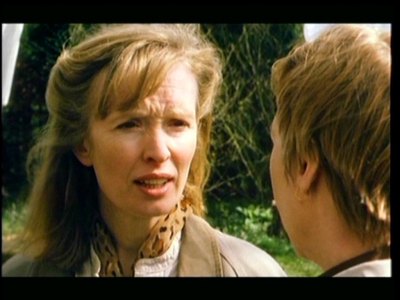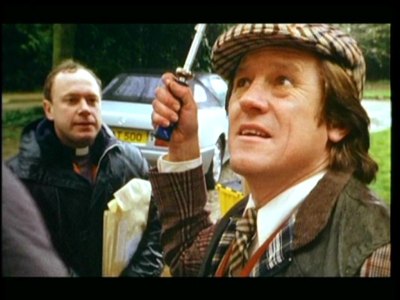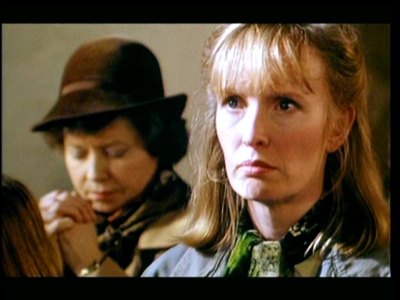| Reviews & Columns |
|
Reviews DVD TV on DVD Blu-ray 4K UHD International DVDs In Theaters Reviews by Studio Video Games Features Collector Series DVDs Easter Egg Database Interviews DVD Talk Radio Feature Articles Columns Anime Talk DVD Savant Horror DVDs The M.O.D. Squad Art House HD Talk Silent DVD
|
DVD Talk Forum |
|
|
| Resources |
|
DVD Price Search Customer Service #'s RCE Info Links |
|
Columns
|
|
|
Rector's Wife
Based on the international best seller by Joanna Trollope, 1993's The Rector's Wife takes on the potentially interesting story of a middle-aged woman rebelling against the confines of an unhappy marriage, an unsatisfying vocation, and a supposedly small-minded religious community. However, The Rector's Wife is so determinedly one-sided in its depiction of the story's villain - the husband/vicar and the church-going village - while turning a blind eye to some of the rather questionable actions of the heroine, Anna, that it quickly degenerates into cheap melodrama, with a cop-out ending that robs the story of any lasting impact.

Inverting certain plot elements of Madame Bovary, Trollope tells the story of Anna Bouverie (Lindsay Duncan), a rector's wife in the small village of Loxford, England. Married for twenty years to Peter (Jonathan Coy), and with two children, Anna quietly strains against the expected duties of being a vicar's wife, while resenting the relative poverty that she and her children are expected to live in (she works part-time at home, translating German technical manuals). When Peter comes up for an opening to be archdeacon of the district, Anna hopes that this move upward will be save her marriage - and her sanity.
When another man is named to be archdeacon, Peter descends into a deep depression, a depression that Anna can not reach. She encourages him to quit his life as a vicar, but he can't; he feels it's his calling, and that this setback may be a test from God that he must endure. Anna, however, is tired of enduring their poverty, and sets out to change it, particularly when she can't stand the fact that her daughter Flora (Lucy Dawson), is being bullied at the local school, and her son Luke (Simon Fenton) wants to go on a trip with his school friends to India. With a plan to put Flora in a private Catholic school, Anna seeks employment as a store clerk outside the village. Both of these actions are taken as slaps to the face of Peter, who feels bad enough as it is that he hasn't advanced in the church hierarchy. The town as well disapproves of Anna's actions (from what I gather in the film, it's frowned up for a vicar's wife to work outside of church duties). But Anna finds a liberation in getting away from the town and the drudgeries of church work, and continues on with her job, much to the disapproval of her husband.
Aware of Anna's plight is next-door-neighbor, Patrick O'Sullivan (Miles Anderson), a rich businessman who's bought the old rectory next to Peter and Anna's new residence. Watching Anna walk around (rather melodramatically) in her red cape, Patrick decides to play the role of country squire to the hilt by setting out to seduce Anna. After a blunt pass is rejected by Anna, Patrick thinks that by offering to help Luke through school, he can bed Anna. Meanwhile, the new archdeacon, Daniel Byrne (Ronald Pickup) visits the parish in hopes of getting help from Peter in acclimating himself to rural life. Peter cannot rouse himself to help, and Daniel recognizes that Peter may be worse off psychologically than Anna may realize. Not helping matters with Anna are the efforts of local churchgoers (with the consent of Peter) who offer their services to Anna to take over some of her duties. Some of the locals obviously delight in gossiping about the rector's wife working outside the home, but they seem to genuinely want to help Anna and Peter. Anna, however, takes their actions as meddling and patronizing, particularly when they go so far as to clean her house without asking her (an action that the churchgoers acknowledge as ill-advised).
While Patrick pursues Anna, she picks up another admirer in Jonathan (Stephen Dillane), Archdeacon Daniel's brother. Jonathan, an author who appears rather aimless in his pursuits, locks onto Anna when he comes to town for Easter service, and pursues her rather more successfully than the inept Patrick. In no way stopping Jonathan's advances, Anna finds release in Jonathan's arms, and decides that she must leave Peter. But a series of events come crashing together in Anna's life - including the disclosure to Peter that Anna is having an affair (even though the wrong man is identified) - that will change her world forever.
If the intention of The Rector's Wife was to make Anna a heroine that we sympathize with and root for, several factors lacking in the script and direction minimize that effort. In portraying the life of a rural rector and his family, several characters mention the relatively dire economic situation the family lives in, particularly the supposedly substandard new rectory they live in. But from my eyes, it's a pretty nice place; I can imagine quite a few viewers of the show watching this film and saying, "I'd take that place in a second." Now that may seem like nitpicking, but it does speak to a larger issue of Anna's dissatisfaction with her life, later in the film. As well, critical aspects of the family's poverty, as well as the children's plights in school, are never addressed. According to the story, Flora is getting bullied by other children in school, but we never really see it, nor do we see the fact that supposedly, their clothes are second-hand (watching the family scenes, they appear to be relatively well off for such a poor family). We hear about these issues, but they're not dramatized. It's shorthand that undermines one of the story's central plotline - that the family is somehow besieged by economic and social forces.

The characterization of Anna as a sympathetic figure doesn't bear too close a scrutiny, because some of her actions are questionable, at best. According to the story, she's been a rector's wife for twenty years, and is now chaffing at the duties that go along with that role. She wants to be independent of the church, she says; she wants to be her own woman. But this rebellion only comes after Peter fails to get his promotion. And as Anna tellingly states, "I'm 42 and I don't expect I ever will be myself now." Considering that Anna only speaks of Peter's possible promotion, prior to the final decision, in terms of more money earned, her disappointment at his failure and her instigation of her eventual rebellion, comes off as rather shallow. Anna won't have more money, and she's upset by it. Yes, she wants her children to have more opportunities, but with her statement that she won't be herself now that more money won't come in, that seems to indicate where her disappointments lie.
And how does more money allow her to finally be "herself?" Wouldn't she still have many duties (if not more) to the church once her husband became archdeacon? The film likes to make Peter out to be the villain of the piece, and it's easy to see why. Shut-off, depressed, largely intolerant of Anna's wishes, the filmmakers want Peter to come off as negative as possible, and they do a good job of it. Many of his actions are unsympathetic, but there's an obvious pity that goes along with the character, too, which the filmmakers try to negate at every turn. Peter's desires to be rewarded by the church for his twenty years of service, and his subsequent frustrations at being thwarted in this goal, are at least mirrored in Anna's equal humiliation at not getting what she feels is her due. One suspects that Anna wouldn't have fallen in love with someone like Jonathan had Peter received his promotion, and this robs her character of quite a bit of audience sympathy, right from the start.
It doesn't help, either, that several of Anna's actions exacerbate her husband's eventual breakdown. The story has Anna asking Peter several times to talk, leading the viewer to feel that each time she's rebuffed by Peter, she might have returned to him if only he would have talked to her. However, Anna made it clear from the beginning that she didn't think Peter was making the correct decision in staying with the church, and actively encouraged him to quit (with the implication being he would make more money doing something else). Anna makes it clear that she's not interested in Peter's religious beliefs (her angry internal dialogue in one church scene, where she upbraids a stained glass depiction of Christ pretty much sums that up), giving him no room to discuss with her what she demands -- leave the church. Not telling Peter that Flora received a hardship tuition from her Catholic school is explained away by Anna, who states Peter would have demanded she quit her job. He probably would have, but that doesn't excuse her lying about it. As well, when her son Luke confronts her about having an affair with Patrick, Anna uses this bit of misinformation on Luke's part to lie to him and deny an affair, even though she's sleeping with Jonathan -- a fact that should have come to Luke via Flora, who was sitting in the back of Jonathan's car when he tenderly, passionately kisses Anna's hand (an act of intimacy in front of her child that Anna doesn't try to hide in any way).
The film gets the meddling of busybody church goers down quite well, and anyone would have been rightly incensed by the women who helped themselves to cleaning Anna's house. But numerous times, Anna herself marvels at the fact that people are offering to help her out with dreary duties, and that she keeps refusing their aid. The film seems intent on painting these churchgoers as somehow anti-Christian in their turning up their noses at her dirty house, or their disapproval at Anna going outside the bounds of her accepted duties as a rector's wife (duties she agreed to twenty years before). But those are minor sins (if you will) at best -- human frailties of gossip, envy, and disapproval, that we can see in everyone. Ultimately, the churchgoers actions, though ineptly and tactlessly implemented, come off as the very basis of Christian good will: they do want to help Peter and Anna, despite their own shortcomings or surface motivations. In Anna's repeated statements that she's consciously rejecting help on her way to independence, you can see a way that Anna might have been more sympathetic to the audience. But the filmmakers stack the deck against Anna with one-sided "villains," and thereby make her actions seem correct in comparison.
The climax of The Rector's Wife, which I won't give away, is the final nail in the story's coffin, coming off as a cheap deus ex machina that clears the way out for Anna, while disastrously eliminating a crucial scene between Peter and Anna that needed to be included for the entire story to make any kind of sense. A total cop-out, this climax also manages to degrade the character of Peter even further, with absolutely no harm done to the character of Anna. It's a dishonest resolution that frees the author from a sticky plot point, as well letting her heroine morally off the hook (wait till you see the final scene, where the author has Anna engage in some pretty astounding rationalizations). What may have started out as an interesting look at a heroine fighting against the expectations put on her by her marriage and her community, quickly becomes a lop-sided affair, with little true give-and-take when the author starts handing out the blame to everyone but Anna.

The DVD:
The Video:
The video image for The Rector's Wife is often grainy and washed out, but that would appear to come from the original source materials (low lighting conditions for a natural look), rather than the 1.78:1 letterboxed transfer.
The Audio:
The Dolby Digital English 2.0 stereo soundtrack is well suited for this presentation. There are no subtitles or close captioning options, but the British accents here are not at all impenetrable, as with some other Acorn Media English titles.
The Extras:
There is a very brief text bio on author Joanna Trollope, as well as cast filmographies, on disc one.
Final Thoughts:
At almost three and a half hours running time, The Rector's Wife had plenty of time to look critically at its heroine, Anna, as well as the shopworn villains it throws up in her path. But unfortunately, The Rector's Wife instead takes an interesting, potentially rewarding story of a woman breaking free of social, religious and marital conventions, and cheapens it with cliched, romance novel mechanics, turning a blind eye to the heroine's shortcomings, while raging against easy social targets. If you enjoy British TV dramas, then you might want to rent The Rector's Wife, but I wouldn't suggest you purchase it.
Paul Mavis is an internationally published film and television historian, a member of the Online Film Critics Society, and the author of The Espionage Filmography.


|
| Popular Reviews |
| Sponsored Links |
|
|
| Sponsored Links |
|
|
| Release List | Reviews | Shop | Newsletter | Forum | DVD Giveaways | Blu-Ray | Advertise |
|
Copyright 2024 DVDTalk.com All Rights Reserved. Legal Info, Privacy Policy, Terms of Use,
Manage Preferences,
Your Privacy Choices | |||||||













